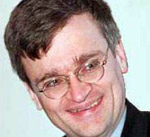EU special representative in the Southern Caucasus Peter Semnebi “gave a warning” to the Armenian and Azeri authorities during a press conference held on July 24. Semnebi pointed out that the future Armenia-EU relations depend on the upcoming liberal and fair Armenian parliamentary elections.
“I think that the upcoming Armenian parliamentary elections will play an essential role in the future relations between Armenia and the European Union. The EU believes that each election must be based on European standards,” said the EU special representative. He added that this is not only important for Armenia, but the Southern Caucasus countries as well. However, Semnebi didn’t mention the European Union’s penalties if the elections in Armenia don’t go according to the international standards.
“I’m not going to talk about the penalties because Armenia has taken on the responsibility of having elections corresponding to European standards,” said Semnebi.
In addition, Peter Semnebi said that the EU is going to follow up on the feedback and rating of the international observers in order to determine the future ties. But Semnebi didn’t mention one important thing-what will the EU do if the Armenian authorities suddenly decide that there is no need to invite international observers to the 2007 elections, just like they did during the constitutional amendments referendum?
The EU special representative’s next topic was the Karabakh conflict.
“Unfortunately, the sides weren’t able to come to terms regarding the conflict settlement before the “Great Eight” summit, however, we are doing everything we can to settle the conflict soon,” said P. Semnebi.
He said that the EU is against settling the conflict through war and they are against any call for war, no matter which side it’s from.
“Any kind of attack will have a negative influence on the country and the society. Economy is becoming worldwide, investments are being made and the war may cause a blow to world economy,” says Semnebi.
The EU special representative said that he hadn’t made any new offer to the sides. The Armenian side doesn’t expect any new offers during the visit of OSCE Minsk Group co-chairman Matthew Bryza to Armenia. According to Minister of Foreign Affairs of Armenia Vartan Oskanyan, the main principles of the conflict won’t change and Bryza can only talk about the “minor changes”.
“Armenia only expects Matthew Bryza to convince Azerbaijan to continue negotiating on the same document. The Armenian side has already made its decision. If Azerbaijan agrees to discuss those principles again, then there will be progress. It will be a pity to lose this kind of document because these kinds of documents are formed throughout the course of negotiations. If Azerbaijan doesn’t approve these principles, then we will face serious issues in the future,” said Vartan Oskanayan.
On July 25, Peter Semnebi also met with President of Armenia Robert Kocharyan. Journalists wanted to know how Kocharyan was doing because the president had declared that he had some heavy respiratory problems and couldn’t take part in the CIS summit in Moscow. Vartan Oskanyan tried to cover up and said that the president was doing fine.
“He’s fine. I talked with him this morning. His voice was a little shaky, but it seems as though he’s doing better,” said Oskanyan.
Peter Semnebi had this to say about Kocharyan’s health.
“I must say briefly that Robert Kocharyan was in good condition.”
However, it is worth mentioning that according to doctors, the heavy respiratory problems (the flu) are cured in a week, so it’s interesting to know how Robert Kocharyan recuperated in two days?

